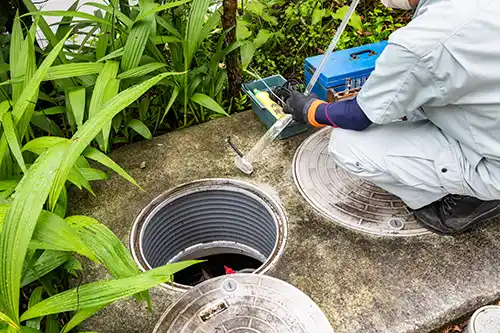
If you need to hire someone to inspect or repair your septic system, this guide will help you make informed decisions.
Why You Need to Inspect Your Septic System
Failing septic systems and cesspools can contaminate drinking water, shellfish beds, and beaches. Title 5 of the State Environmental Code protects us by requiring inspection of private sewage disposal systems. Local boards of health receive these inspection reports. Most systems will pass inspection. Title 5 requires the replacement or upgrade of systems that fail.
If you own a home with a septic system or cesspool and plan to put it up for sale, add a bedroom, or change its use, you will need to get a system inspection. This information will help you make the right decisions about who to hire and how to finance repairs.
You'd Better Shop Around
When you need to hire a system inspector, there are two important things to remember:
- MassDEP does not regulate inspection fees, nor does any other state agency. Inspectors can charge whatever their customers are willing to pay. The fee also may vary depending on the complexity of the inspection.
- Only certain professionals may perform Title 5 system inspections:
- Professionals who meet experience requirements and have passed a MassDEP-administered exam;
- Registered Sanitarians;
- Certified Health Officers; and
- Registered Professional Engineers who specialize in civil, environmental or sanitary engineering.
For a list of qualified system inspectors in your area, contact your local Board of Health. You can also see lists of approved system inspectors on the New England Interstate Water Pollution Control website.
Before hiring anyone, do some comparison shopping:
- Get written estimates from several inspectors. Ask them whether the price of the inspection includes pumping the system; often it does not.
- Ask for and check each inspector's identification and references.
- Before signing a contract, be certain that it spells out the work plan, the cost and payment terms, and any guarantees the inspector is willing to provide.
- Once the inspection is complete, make sure the person who signs the form is the same person who conducted the inspection.
What to Do if Your System Fails
If your system fails inspection, Title 5 allows up to 2 years to complete repairs or an upgrade. The first thing you should do is contact your local board of health, which needs to approve all upgrades and most repairs. The board of health will tell you what you will need to do.
Again, shop around. Get written estimates, check qualifications and references. Remember that you are under no obligation to have the person who inspects your system perform any other work on it. In fact, you may want to hire separate contractors. While most septic system professionals are honest, as in any other profession there may be a few "bad apples" who try to take advantage of the consumer. If you have a complaint, contact your MassDEP regional office and speak to the staff responsible for Title 5. If you receive an inspection report that appears to have been altered or contains false or misleading information, call the Massachusetts Environmental Strike Force at 617-556-1000 or toll free at 1-888-VIOLATE (1-888-846-5283).
Repair or upgrade costs will vary depending on the nature of the problem, soil conditions, distance to water supplies, and the size of the lot. Title 5 does not specify who must pay for the system inspections, repairs or upgrades. Keep that in mind if you are planning to sell your home. You may find during negotiations that the prospective buyer is willing to assume some or all of the costs. Be sure to consult with a lawyer or mortgage lender who is familiar with Title 5 before closing the deal.
Even if you plan to stay in the home, you may qualify for financial aid programs for septic system or cesspool repair or replacement:
- Many cities and towns have "betterment" programs for long-term, low-cost financing.
- State law provides for a system repair tax credit of up to $6,000 per homeowner.
- The Massachusetts Housing Finance Agency (MHFA) offers septic-system repair loans.
- USDA Rural Development offers single-family housing repair loans and grants.
To get your system professionally inspected by contact Morse Engineering and Construction.
